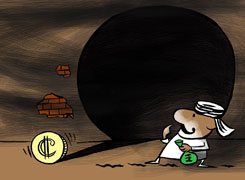Ramalingam Kalirajan |11052 Answers |Ask -Follow
Mutual Funds, Financial Planning Expert - Answered on May 26, 2024
He has an MBA in finance from the University of Madras and is a certified financial planner.
He is the director and chief financial planner at Holistic Investment, a Chennai-based firm that offers financial planning and wealth management advice.... more

I have a query regarding PPF. I am 46 years old. I have a PPF account from 2000 and invest in it . and also I started a PPF account in my sons name which I started when he was 3 years young in 2010 operated by my wife. Currently I invest max amount in it. What are the rules , in regarding 1) complete withdrawal when the account matures , and at that time the check will be given in whose name 2) partial withdrawal before maturity and at that time the check will be given in whose name ?
You have made wise decisions by investing in PPF accounts for yourself and your son. Let's explore the rules regarding complete and partial withdrawals from these accounts.
Complete Withdrawal upon Maturity
Your PPF Account
Your PPF account, started in 2000, will mature after 15 years, and you can extend it in blocks of 5 years.
Maturity Withdrawal Process
Timing: Upon maturity, you can withdraw the entire amount.
Check Issuance: The maturity proceeds will be given in your name.
Extension Option
Without Withdrawal: If you extend without withdrawal, the balance continues to earn interest.
With Withdrawal: You can withdraw once a year without closing the account.
Your Son’s PPF Account
Your son’s PPF account, started in 2010, follows similar rules. When it matures, the proceeds can be withdrawn fully.
Complete Withdrawal for Minor's Account
Timing: The account matures after 15 years from the start date, so in 2025.
Check Issuance: The maturity amount is payable to your son. If he is a minor, the cheque will be issued in the guardian’s name.
Partial Withdrawal Rules
Your PPF Account
Partial withdrawals are allowed from your PPF account after completing 5 financial years.
Rules for Partial Withdrawal
Timing: Allowed from the 7th year onward.
Amount: Up to 50% of the balance at the end of the 4th year or the immediate preceding year, whichever is lower.
Check Issuance: The cheque will be in your name.
Your Son’s PPF Account
Partial withdrawals from your son’s PPF account follow the same rules, but there are additional conditions for minors.
Partial Withdrawal for Minor’s Account
Timing: Allowed from the 7th year onward.
Amount: Up to 50% of the balance at the end of the 4th year or the immediate preceding year, whichever is lower.
Check Issuance: The cheque will be issued in the guardian’s name, operated by your wife.
Ensuring Smooth Withdrawals
Documentation
Ensure proper documentation for withdrawals. For your son’s account, you need proof of your wife being the guardian.
Planning
Plan withdrawals considering the tax implications and future needs. PPF interest is tax-free, making it beneficial for long-term savings.
Strategic Considerations
Maximizing Benefits
Continue maximizing investments in PPF for its tax-free interest and Section 80C benefits.
Monitoring Accounts
Regularly monitor both accounts to ensure they align with your financial goals. Utilize partial withdrawals wisely to avoid unnecessary tax burdens.
Managing Financial Goals
Long-Term Goals
Your PPF accounts are excellent for long-term goals, like your retirement and your son’s education or marriage.
Diversification
While PPF is safe and tax-efficient, consider diversifying with other investments to balance growth and risk.
Seeking Professional Guidance
Certified Financial Planner
Consult a Certified Financial Planner to tailor your investment strategy. Professional guidance ensures your financial plans are robust and aligned with your goals.
Regular Reviews
Regularly review your financial plan and adjust it as needed. Life changes and market conditions may require updates to your strategy.
Your commitment to securing your financial future and that of your son is commendable. PPF is a reliable and tax-efficient tool for this purpose.
Conclusion
In conclusion, understanding the withdrawal rules for your PPF accounts helps you make informed decisions. Proper planning and regular reviews ensure you maximize benefits from these investments.
Best Regards,
K. Ramalingam, MBA, CFP,
Chief Financial Planner,
www.holisticinvestment.in
You may like to see similar questions and answers below
Mihir Tanna |1101 Answers |Ask -Follow
Tax Expert - Answered on Nov 17, 2022
Sanjeev Govila | Answer |Ask -Follow
Financial Planner - Answered on Feb 06, 2024
Ramalingam Kalirajan |11052 Answers |Ask -Follow
Mutual Funds, Financial Planning Expert - Answered on May 26, 2024
T S Khurana |558 Answers |Ask -Follow
Tax Expert - Answered on Aug 31, 2024
T S Khurana |558 Answers |Ask -Follow
Tax Expert - Answered on Oct 30, 2024
Pankaj Vyavahare |18 Answers |Ask -Follow
Career Counsellor, Life Coach - Answered on Mar 05, 2026
Dr Shakeeb Ahmed Khan |186 Answers |Ask -Follow
Physiotherapist - Answered on Mar 05, 2026
Dr Shakeeb Ahmed Khan |186 Answers |Ask -Follow
Physiotherapist - Answered on Mar 05, 2026
Samraat Jadhav |2554 Answers |Ask -Follow
Stock Market Expert - Answered on Mar 05, 2026
Ramalingam Kalirajan |11052 Answers |Ask -Follow
Mutual Funds, Financial Planning Expert - Answered on Mar 05, 2026
Ramalingam Kalirajan |11052 Answers |Ask -Follow
Mutual Funds, Financial Planning Expert - Answered on Mar 05, 2026
Ramalingam Kalirajan |11052 Answers |Ask -Follow
Mutual Funds, Financial Planning Expert - Answered on Mar 05, 2026
Ramalingam Kalirajan |11052 Answers |Ask -Follow
Mutual Funds, Financial Planning Expert - Answered on Mar 05, 2026
Mayank Chandel |2636 Answers |Ask -Follow
IIT-JEE, NEET-UG, SAT, CLAT, CA, CS Exam Expert - Answered on Mar 04, 2026
Mayank Chandel |2636 Answers |Ask -Follow
IIT-JEE, NEET-UG, SAT, CLAT, CA, CS Exam Expert - Answered on Mar 04, 2026




























